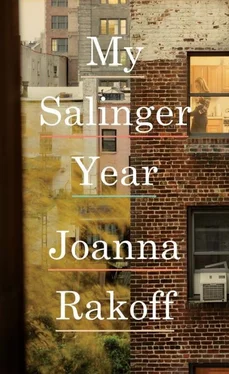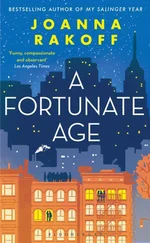And was this worse or better than writing a book as revenge?
Or were the two not, perhaps, mutually exclusive?
That night, as I walked to the subway, I realized that Don, too, had murdered off a girl who had hurt him.
3

Three Days of Rain
On a stormy Thursday night, Don left for the wedding, duffel slung over his shoulder. “Bye,” he said, kissing me roughly, his arms wrapped in my blue waterproof shell. Often, he took my clothing—Levi’s, T-shirts, fisherman’s sweater, Frye boots—without asking, but I’d offered him the shell to prove that I wasn’t upset. He seemed nervous, tense, oddly exhausted by the effort of packing—worried that he had no suit to wear—and I wondered if, for the moment, he regretted disinviting me. Or, well, he’d never actually invited me. I’d just assumed that I was meant to go along. Regardless, I’d refused to help him pack. “Do you think I can wear this to the ceremony?” he’d called, holding up some wrinkled garment.
“I don’t know,” I murmured, not looking up from my manuscript, the first I’d pulled out of the slush pile. Rumors abounded of great writers pulled from the slush, but the queries my boss received suggested there was no veracity to them. Each week I sifted through letters printed on cloud stationery and cat stationery, letters in novelty fonts like Zapf Dingbats or Lucida Calligraphy, letters that recounted dreams or spoke of astrological charts, letters proposing books on Ayurveda for gerbils or the Tao of parasailing, letters from budding crime novelists and mystery writers, with self-created logos at the top, featuring guns or daggers or blood dripping from the letters of their names, letters from eroticists involving the word “moist,” letters from memoirists recounting atrocities. The letter from the writer whose novella I was now reading had stood out in its simplicity. Times New Roman on plain white paper. Stories in small, respected magazines; no MFA but a BA from Barnard. I was halfway through the novella, about a little girl whose alcoholic father drags her to bars with him—rather than sending her to school—and was pleased to find that it was good. Really good. Small in scope, elegiac in tone, precise in language. Good.
“Well, can you take a look?” he asked, irritated.
I looked up and shrugged.
“Come on, Buba, you’re good at this kind of thing,” he pleaded. “Tell me what to wear. I don’t have a suit, so some sort of shirt and pants. With a tie?”
I succumbed. “You can’t wear a tie if you’re not wearing a jacket. You’ll look like a Bible salesman.” This was my mother’s line. I had never actually seen a Bible salesman.
“Fuck it,” said Don, throwing what looked like a guayabera into the duffel.
In the courtyard, he paused for a moment and looked back at me, pursing his lips in a kiss. I raised my hand to wave, but it was too late. He’d already turned away.
It was spooky in the apartment alone, at night. The shadows from the trees in the courtyard moved darkly across our red floors, and the noises from the apartments above and below only reinforced my solitude. I was alone in a big city, in an apartment with a door so flimsy I myself could force it open.
In the morning, though, I felt a strange lightness. Don was gone. I had no obligation to call him, to check in with him, to align my plans with his. I lingered at home longer than usual, drinking strong coffee made in my little espresso pot—I always felt selfish using it when Don was home, as it only brewed enough for one—and put on a plaid dress I knew he hated, long and loose and comfortable.
In Williamsburg, everything was the same—young people heading for their offices clad in vintage dresses and chunky glasses fogged over from the rain—but in midtown it became clear, suddenly, that it was August. The streets were empty. As a treat, I bought my coffee at the elegant food shop from which I’d heretofore purchased only that single, transformative sandwich and where I was the sole customer, the servers standing with their arms crossed across their crisp white shirts, tapping their feet in boredom. My office, too, was empty. The agents were all at their country houses in Rhinebeck or the North Fork or simply in their air-conditioned apartments, taking reading days. The accountant was on vacation, as was one of the two bookkeepers. Olivia was gone, of course, and Max and Lucy still without an assistant. Even Hugh wasn’t in. The office felt off-kilter, spectral, without him. Pam and I and the second bookkeeper were, it seemed, the only people in the office, the world.
Alone, I couldn’t sit still. While my coffee grew cold on my desk, I gathered the week’s filing and walked through the office, placing contracts and cards and correspondence in their appropriate folders and filing cabinets, which took all of twenty minutes. I had some contracts to go over, some permissions forms to fill out, and, of course, the never-ending piles of slush and Salinger letters. It was ten thirty. I had three hours until the office closed at one thirty. Taking a sip of chilled, murky coffee, I opened the drawer of letters and pulled a handful out at random. A man in the Netherlands—Salinger had a large following among the Dutch, based on his fan mail—who loved The Catcher in the Rye and had, on a trip to New York earlier this year, traced Holden’s steps around the city. Though it was winter, he had in fact seen ducks in Central Park. Was Salinger aware that the ducks now stayed in Central Park through the winter? A girl at a boarding school who had just read Franny and Zooey and was arguing with her friends about whether Franny was pregnant or not. The girl said yes, but some of her friends said no. Could Salinger settle the debate?
Pulling out my letterhead, I typed a form letter to the Dutchman. So many fans referred to those ducks in Central Park. As a kid, I’d fed these ducks with my dad, sometimes well into the cold weather. I distinctly remembered standing at a pond somewhere on the East Side, near the Met, in the Tyrolean-style coat I’d worn around age six, my hands freezing as I tore bread into bits. Could this man be right? Did the ducks stay in Central Park through the winter?
Writing to the prep school girl, I couldn’t resist adding a line explaining that Mr. Salinger prefers his stories to stand on their own, without explanation or commentary from the author. “Even if I were able to pass on your letter—which, as stated above, I cannot—it’s unlikely he would indulge your question with an answer. If there is ambiguity in Mr. Salinger’s stories, it is purposeful. As I’m sure you know, he has often been asked whether or not Franny is pregnant”—I knew this to be true, from the letters that came in and from Hugh, though I had no idea what it meant—“but, again, he leaves it to the reader to decide whether or not this is so. In literature, as in life, sometimes there are no right answers.” Part of me wanted to keep going, to tell this girl that she needed to be firm in her convictions, to resolve debates herself, without seeking outside authority, that the fact that she’d written to Salinger—who she surely knew would not be likely to write back—showed pluck and gumption, and she should run with those qualities; that the world outside Choate or Exeter or Deerfield Academy was even more complicated, and she would need to know her own mind to get by. And part of me thought that if Salinger were writing this letter himself, he might actually say those things. Or tell her to read poetry instead of Franny and Zooey . But I said none of that. I had said enough. “Best,” I typed. “Joanna Rakoff.”
Читать дальше













